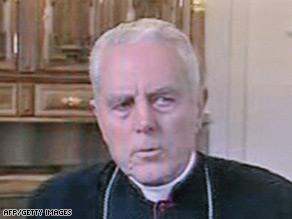
A German court Monday refused to intervene in the case of Bishop Richard Williamson, who is facing prosecution for denying the Holocaust — a crime in Germany.
Williamson asked the court to order Swedish Public Television to restrict broadcast of an interview in which he doubts the existence of Nazi gas chambers and a systematic Nazi plan to annihilate European Jewry. Williamson sought the help of the court because Holocaust denial is punishable in Germany only if it is publicized there. The court refused the request, it announced Monday. His lawyers argued that giving an interview to a Swedish television station did not constitute denying the Holocaust in Germany — although he was physically in the country when he made the remarks. Williamson hit the headlines last month when he and three other ultra-conservative bishops were welcomed back into the Roman Catholic Church, more than 20 years after Pope John Paul II excommunicated them on a theological question unrelated to the Holocaust. The state court of Nuremberg-Fuerth ruled that the bishop would have had to notify Swedish reporters of any restrictions before the interview. According to the court, Williamson also wanted the interview removed from the network’s Web site. The court said it is clear that the Swedish network is available on satellite in many countries and that he knew they had a Web site which can be seen around the world. A German district attorney announced February 4 that he had launched a criminal investigation against Williamson on January 23. Regensburg District Attorney Guenther Ruckdaeschel said authorities are investigating whether his remarks can be considered “inciting racial hatred.”
Don’t Miss
Holocaust-denying bishop removed from post
Pope’s move angers Jews
Vatican: Bishop must recant Holocaust denial
Pope urged to act on Holocaust-denying bishop
Denying the Holocaust in Germany is punishable by up to five years in prison. “I believe that the historical evidence is strongly against — is hugely against — six million Jews having been deliberately gassed in gas chambers as a deliberate policy of Adolf Hitler,” Williamson said in the interview, which also appeared on various Web sites after broadcast. “I believe there were no gas chambers.” Williamson and three other bishops who belong to the Society of Saint Pius X were excommunicated in 1988. The society was founded by Archbishop Marcel Lefebrve, who rebelled against the Vatican’s modernizing reforms in the 1960s, and who consecrated the men in unsanctioned ceremonies. The rehabilitation of Williamson sparked harsh condemnation from Israel, American Jewish leaders and German Chancellor Angela Merkel, among others. The Vatican has pointed to several statements by Pope Benedict XVI in the past few years condemning the destruction of European Jewry, including his visits to concentration camps. He has also said he did not know of Williamson’s views on the Holocaust when he lifted the excommunication. The Vatican has said Williamson will not be allowed to perform priestly functions until he recants his Holocaust denial. He has apologized for “distress” his remarks caused the pope, but he has not retracted them. On Sunday, Merkel phoned Pope Benedict about the issue, though neither side seemed to have shifted its position over Williamson. In addition, Williamson was removed over the weekend as head of a seminary in Argentina. The views of Bishop Williamson, who has led the seminary in La Reja since 2003, do not reflect those of The Society of St. Pius X, said Christian Bouchacourt, head of its Latin American chapter. Bouchacourt said, in effect, Williamson had no business discussing the Holocaust issue. “It’s obvious that a Catholic bishop cannot talk with the ecclesiastical authority but to things related to faith and morality,” Bouchacourt said in a written statement.